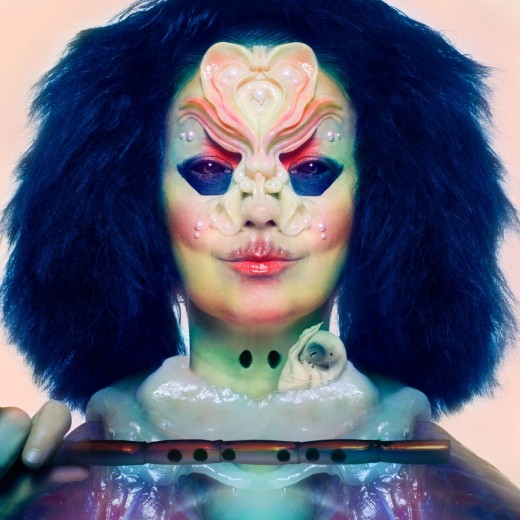A concise title is such lovely gift. Being able to neatly summarise a complex and expansive piece of art is a pure form of poetry. Björk’s latest LP has one of those titles: Utopia. Of all the words that she could pluck out of her expansive multilingual dictionary, why did a word which such loaded connotations leap out at her? On a global scale, any form of utopian ideal is running threadbare as pretty much everything around us falls into a state of disarray. In the context of Björk though, this is her first album after the emotionally raw exploration of the death of love that was Vulnicura. Two years ago, she presented us with an uncomfortably resonant voyage into the dark recesses of her soul. With such overwhelmingly negative surrounding, why choose such a hopeful word? Because that’s what she and, by extension we, need: Something better to strive for. While for a lot of the album, this earnest attempt at finding purpose feels messy and unfocused, when it all comes together, there is an emotional warmth and elation that is simply euphoric.
The entire album is surprisingly neatly represented in a single song: ‘Body Memory’. On Vulnicura, the song that stood strongest wass “Black Lake”, A 10-minute treatise on hopeless and bitterness filled with lyrics like “I’m drowned in sorrows, No hope in sight of ever recover, Eternal pain and horrors”. But despite the unremittingly bleak words still fresh on her tongue, Björk has opted to redefine her life’s manifesto. This is where ‘Body Memory’ enters. It is a perfect response to everything that ‘Black Lake’ was. It matches its length and clarity, but inverts the former’s intent and finds strength and confidence. Here she has found her feet again and is willing to kick against the pricks as hard as she possibly can: “Then the body memory kicks in, My warrior awakens, My turn to defend, Urban didn’t tame”. , While it may struggle under the strain the of its length and lack a truly memorable hook ‘Body Memory’ is beautiful and genuinely life-affirming.
This isn’t Björk’s best work. That much is irrefutable. The first issue is the length, it being her longest release by at least ten minutes when it really does not need to be. A better editor could have found a more than few minutes to shed here. As we move closer and closer to the album’s closer, songs like “Losss” and “Saint” begin to wear thin. Additionally, the central musical motif here is natural instruments like pan pipes and choral voices. They’re gorgeous in their own right, but after nearly seventy minutes, they begin to all merge into a kind of amorphous blob. Where in the past, her stylistic choices have been thoroughly explored and are pretty much bulletproof, things are much looser and chaotic here, but not always in the right ways. Musically, the landscape feels a little underdeveloped and at times it veers into a sort of easy listening which Björk has always stood in stark contrast to.
But then there is the words and this where the true magic lies. The fractured, jittery poems are simply magical. Whether they focus on the little joys in making mixtapes for new lovers or the more grandiose ventures of actively trying to find a reason, joy and passion in a life that has taken a taken a thrashing. ‘Arisen My Senses’, ‘The Gate’ and ‘Features Creature’ all represent some of the best work Björk has done in the decade. She hasn’t been this romantic or as straight up optimistic and joyful since Debut, Post or Vespertine. These little nuggets of sheer jubilance and exalt, they do a massive job in offsetting the other issues of the album. Sure, at times, you can’t find anything musically to hang your ears on and things sound a bit weird for the sake of weird. But when you’re presented with such glee and earned confidence, you can’t help but be swept along for the tangled, twisty, glorious whirlwind that is this record. Will Murphy





